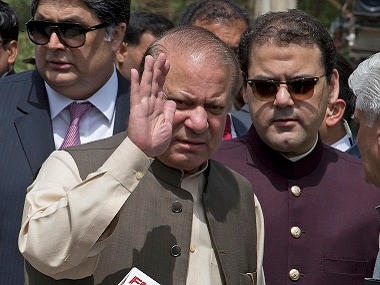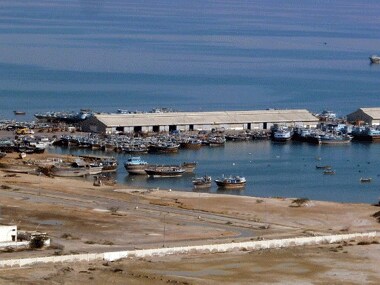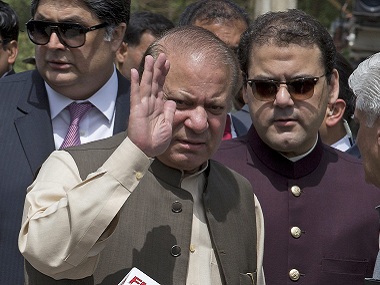Come another month, and Pakistan will be going into general elections. This exercise is usually fraught with not just the usual charges of corruption, misgovernance and sundry other allegations, but also veiled pointers indicating the side the “establishment” is backing. This time around, these pointers are far less hidden. The “establishment”, which for lay readers means the military, its intelligence agencies and sections of the bureaucracy, have more than made their preferences clear — they don’t like Nawaz Sharif and they don’t like his immediate family. This dislike has been on the front pages for the last few months, and at present, the courts and every investigative agency in the country is bent upon proving Sharif guilty of corruption and thievery on a massive scale before the elections are held. On the face of it, this may seem daunting to the staunchest political head, but not Sharif. He’s more than used to this. [caption id=“attachment_4280599” align=“alignleft” width=“380”] File image of Nawaz Sharif. AP.[/caption] The problem for the establishment is that a number of factors favour the Pakistan Muslim League (Nawaz) as a party. First,
the victimisation of Sharif by the courts
has been so apparent that it hardly needs any reiteration. Just two months ago, the Supreme Court of Pakistan barred him from holding any public position during his lifetime due to the very controversial Article 62 (1)(f) of the constitution, which demands that public servants be honest (’ameen’) and altogether untarred by corrupt practices. This was seen by even the most even-handed as irrational in the extreme and is likely to help Sharif rather than otherwise. After all, the former prime minister has honed “victimisation” into a poll tactic for years. Second, the attendance at his election rallies in most provinces has been considerable, indicating that party workers have performed their tasks. This means that the party machinery is intact, despite a year or more of battering and doubt. Third, he has an advantage that certain Indian political parties might easily understand — he really has no opponent. Bilawal Bhutto Zardari is a babe in arms compared to the canny Sharif family. Imran Khan of the Pakistan Tehreek-e-Insaf (PTI) has a better profile, but has no national presence. Both Bhutto and Khan will retain their regional ascendancy, but are nowhere near making it to the post of prime minister. While that’s the basic reality, there are other factors that are of interest to those following Pakistan’s elections scheduled for July. An excellent analysis by
The Herald
based on public opinion surveys — carried out along with the Sustainable Development Policy Institute — divides the estimation of polls into two segments. One is the performance of the government according to various benchmarks, which may be by international financial institutions like the International Monetary Fund, or more positive projections by Pakistani institutions themselves. The second is based on a study of public perceptions, a very chancy thing indeed, and likely to be swayed even by last-minute events. Polls are unpredictable at the best of times, but the exercise by The Herald seems as exhaustive and even-handed as possible. Broadly, it gives the PML(N) a little more than a fighting chance, with a majority of voters seeing its performance as “average”. The factors on which the present government was assessed as having done well is the improvement in infrastructure and relative improvement in power sector. In other words, the China-Pakistan Economic Corridor (CPEC) is paying political dividends. This perception will drive the next government — whomsoever it may be — regardless of the fact that the perception itself may be flawed. Regional popularity, or the lack thereof A second factor emerging in the polls is the unsurprising fact that the PML(N) is the most popular in Punjab, which is after all Sharif’s home base. But interestingly, the poll in the party’s favour is more due to his brother Shahbaz Sharif, with figures seeming to show that Nawaz may actually drag down the party in the province instead of up. In simple words, projecting Shahbaz as the central candidate will win more votes in Punjab, than Nawaz. Shahbaz is now “acting president” of the party, but not its boss.
File image of Nawaz Sharif. AP.[/caption] The problem for the establishment is that a number of factors favour the Pakistan Muslim League (Nawaz) as a party. First,
the victimisation of Sharif by the courts
has been so apparent that it hardly needs any reiteration. Just two months ago, the Supreme Court of Pakistan barred him from holding any public position during his lifetime due to the very controversial Article 62 (1)(f) of the constitution, which demands that public servants be honest (’ameen’) and altogether untarred by corrupt practices. This was seen by even the most even-handed as irrational in the extreme and is likely to help Sharif rather than otherwise. After all, the former prime minister has honed “victimisation” into a poll tactic for years. Second, the attendance at his election rallies in most provinces has been considerable, indicating that party workers have performed their tasks. This means that the party machinery is intact, despite a year or more of battering and doubt. Third, he has an advantage that certain Indian political parties might easily understand — he really has no opponent. Bilawal Bhutto Zardari is a babe in arms compared to the canny Sharif family. Imran Khan of the Pakistan Tehreek-e-Insaf (PTI) has a better profile, but has no national presence. Both Bhutto and Khan will retain their regional ascendancy, but are nowhere near making it to the post of prime minister. While that’s the basic reality, there are other factors that are of interest to those following Pakistan’s elections scheduled for July. An excellent analysis by
The Herald
based on public opinion surveys — carried out along with the Sustainable Development Policy Institute — divides the estimation of polls into two segments. One is the performance of the government according to various benchmarks, which may be by international financial institutions like the International Monetary Fund, or more positive projections by Pakistani institutions themselves. The second is based on a study of public perceptions, a very chancy thing indeed, and likely to be swayed even by last-minute events. Polls are unpredictable at the best of times, but the exercise by The Herald seems as exhaustive and even-handed as possible. Broadly, it gives the PML(N) a little more than a fighting chance, with a majority of voters seeing its performance as “average”. The factors on which the present government was assessed as having done well is the improvement in infrastructure and relative improvement in power sector. In other words, the China-Pakistan Economic Corridor (CPEC) is paying political dividends. This perception will drive the next government — whomsoever it may be — regardless of the fact that the perception itself may be flawed. Regional popularity, or the lack thereof A second factor emerging in the polls is the unsurprising fact that the PML(N) is the most popular in Punjab, which is after all Sharif’s home base. But interestingly, the poll in the party’s favour is more due to his brother Shahbaz Sharif, with figures seeming to show that Nawaz may actually drag down the party in the province instead of up. In simple words, projecting Shahbaz as the central candidate will win more votes in Punjab, than Nawaz. Shahbaz is now “acting president” of the party, but not its boss.
 Gwadar Port in Pakistan’s Balochistan. AFP.[/caption] Balochistan is a vital area for the Pakistani security since this is where the CPEC debouches into the Arabian Sea through the Gwadar Port. The most significant development in Baloch politics has been the growth of a number of independents, some of whom have now grouped together under a new banner, the Balochistan Awami Party. The PML(N)’s ability to win over these independents depends on its own viability as a political force and on the depth of its purse. The latter is not in dispute at all. In other words, the elections are less about causes and more about money — and a lot of it. A review of the Urdu media is disquieting, indicating that elections have little to do with the common man. One sarcastic author has recommended that whichever party comes to power, it should nuke its own citizens so that at least the poor and impoverished can find their own way to a heaven that is denied to them in the state. The term “lootacracy” is now in use to refer to politicians skipping allegiances as nimbly as a goat, depending on who offers what. Others foretell an Arab Spring-like event, powered by the squabbles and fake news on social media. Regardless of the result, this is likely to be a deeply troubling election for Pakistan, with an increasing disconnect between the politicians and the voters and little in terms of actual political dialogue. Although this is hardly limited to Pakistan alone, the repercussions here could be far greater. A vengeful military, a spineless judiciary and an economy that is just about holding off a severe debt repayment crisis could result in an unholy mix. Someone should advise Nawaz to get out while the going is good — this prime ministership may be more dangerous than even he can imagine.
Gwadar Port in Pakistan’s Balochistan. AFP.[/caption] Balochistan is a vital area for the Pakistani security since this is where the CPEC debouches into the Arabian Sea through the Gwadar Port. The most significant development in Baloch politics has been the growth of a number of independents, some of whom have now grouped together under a new banner, the Balochistan Awami Party. The PML(N)’s ability to win over these independents depends on its own viability as a political force and on the depth of its purse. The latter is not in dispute at all. In other words, the elections are less about causes and more about money — and a lot of it. A review of the Urdu media is disquieting, indicating that elections have little to do with the common man. One sarcastic author has recommended that whichever party comes to power, it should nuke its own citizens so that at least the poor and impoverished can find their own way to a heaven that is denied to them in the state. The term “lootacracy” is now in use to refer to politicians skipping allegiances as nimbly as a goat, depending on who offers what. Others foretell an Arab Spring-like event, powered by the squabbles and fake news on social media. Regardless of the result, this is likely to be a deeply troubling election for Pakistan, with an increasing disconnect between the politicians and the voters and little in terms of actual political dialogue. Although this is hardly limited to Pakistan alone, the repercussions here could be far greater. A vengeful military, a spineless judiciary and an economy that is just about holding off a severe debt repayment crisis could result in an unholy mix. Someone should advise Nawaz to get out while the going is good — this prime ministership may be more dangerous than even he can imagine.
Pakistan election: Polls show Nawaz Sharif still stands a chance despite Bilawal Bhutto, Imran Khan's regional popularity
Tara Kartha
• June 29, 2018, 10:36:53 IST
Regardless of the result and whether Nawaz Sharif wins, the elections in Pakistan in July is likely to be deeply troubling.
Advertisement
)
Consider that Nawaz carefully chose a political non-entity to be the prime minister once he was booted out of office. This is South Asia, where family comes first. Nawaz will want a succession line for the head of state into his own family, not that of a brother with two sons. The picture in Khyber Pakhtunkhwa is likely to be far more complex. Imran Khan’s PTI, notwithstanding its strong tendency to take to the streets on any pretext, seems to have provided some delivery in terms of infrastructure to the province. The polls indicate that Chief Minister of Khyber Pakhtunkhwa Pervez Khattak may reap the benefit of a reasonable tenure, but the credit for an eventual merger of the Federally Administered Tribal Areas with the province may go to the central government instead of PTI. That picture has yet to emerge, though the fact that this was pushed through at the last minute by the Centre indicates that it is fairly confident of this being a vote winner. The seething discontent that is apparent in the Pashtun Tahaffuz Movement, and the fact that many of them are being incarcerated in jail, will work strongly against the state government, which at any rate was dilatory in extending its support to the Pashtuns — and this could work in PML(N)’s favour. In Sindh, the ten-year rule of the Bhutto family’s Pakistan Peoples Party (PPP) seems to be facing its worst low in years. Ominously, disappointment with the government is not just across the urban electorate, but also in the rural areas, indicating that the party’s traditional vote bank is eroding. However, it benefits from the fact that the Muttahida Quami Movement (MQM), which was once a kingmaker from its seat of power in Karachi, has divided and subdivided itself into a mess. This was due, in part, to the complete irrationality of its founder Altaf Hussain as well as the Pakistani intelligence’s chess moves. There’s another problem that the MQM — any faction of it — will have to face. The Mohajir community has seen a steadily declining birth rate, apparent in the Pakistan census data from 1981 and 1998. Along with this is the fact that the Pashtun population has increased steadily with thousands fleeing the unrest in the tribal areas. There is no available reliable count of how many live in Karachi, leave alone in other districts. In the recent delimitation exercise, at least one constituency (NA-250) has an overwhelming Pashtun voting presence. Once caught between the major political parties, Pashtuns are now making their presence felt through huge support for the Pashtun Rights Movement, with rallies seeing an attendance of a reported 15,000. There are some 40 million Pashtuns in Pakistan, and this ethnic group is likely to become a kingmaker of sorts if the present trend of events continues. If Nawaz wants to win, he has to appease this group in all the provinces where they have been harried, jailed and abused. Politics in Balochistan has become so muddied that it is extremely difficult to predict an outcome. Baloch politics is far more locally influenced than most, with tribal chiefs traditionally having the dominant say in the make up of the government. This was rudely shattered when Baloch chief minister Nawab Sanaullah Zehri — a powerful tribal chief in his own right — was summarily dismissed by his own party members. He was replaced by a relative political non-entity, Mir Abdul Quddus Bizenjo. One of the key dissidents was another political newbie, Mir Sarfaraz Ahmed Bugti, who hails from the Bugti tribal lands where security forces are more or less encamped permanently. [caption id=“attachment_630314” align=“alignright” width=“380”]
End of Article